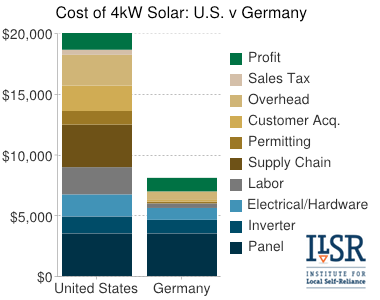Golly. Strap on your jackboots, Dopers, and prepare to stomp the hooey outta some of my ignorance (thoughtfully wrapped for you in parentheses, but feel free to tear apart whatever else I seem to be certain of)! The nature of this thread invites discussion of considering an elevated financial cost of solar as an investment in mitigating climate change. Let’s try and avoid that here–you’ll be preaching to the converted anyway.
GQ stuff:
In a nutshell, Pres. Trump has either enacted or supported (which?) a formidable tariff on Chinese (as opposed to all imported?) solar panels. As I understand it, this increases the net cost of the things to the American consumer by 30%. This hurts China a bit by tossing a jug of ice water on the American demand for their goods (I might pay $100 for a panel, but $130–no way!). This seems to be the foundation for much wailing, rending of garments, and gnashing of teeth amidst seething accusations along the lines of hamstringing USA solar industry in order to make fossils the more cost-effective option for power generation.
GD Stuff:
Ok, even if all of that is correct (please let me know where I’ve got it wrong!), doesn’t this tariff have another effect, namely: making USA-manufactured panels more financially competitive with Chinese? The effect of that would be more jobs on our turf, arguably fillable by former fossil workers. No? And further, if one is open to the idea of China is not our friend, doesn’t it make a certain amount of sense to develop the tech & experience here at home as a hedge against China deciding to ratchet up its own prices one day, just as OPEC does with oil when it wants t flex it’s muscle?
